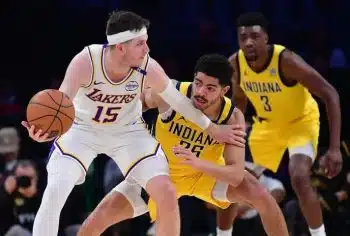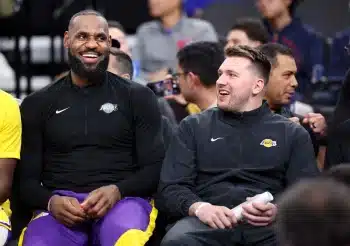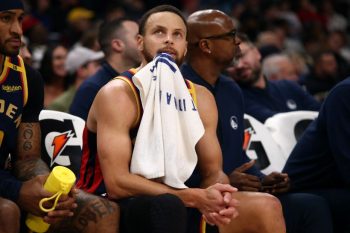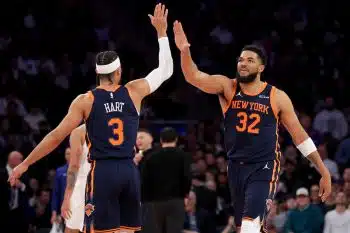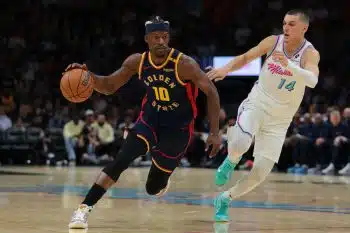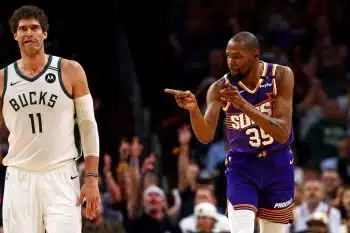NBA
NBA Rookie Extensions: Sign Now or Sign Later?
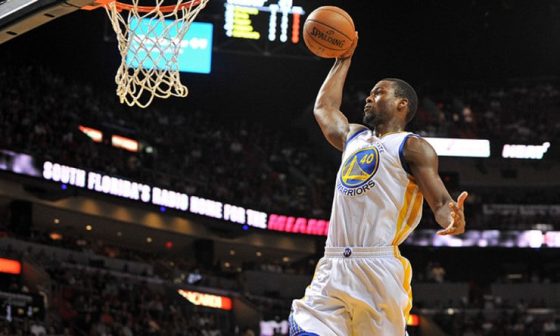
It’s the NBA offseason, so there isn’t much basketball to discuss aside from some Team USA action. What is going on behind closed doors are the contract negotiations between players, their agents and the teams.
Between now and October 31st is the time for the rookie extensions to be signed for the 2012 draftees. The New Orleans Pelicans and the Portland Trail Blazers have already agreed to major extensions for Anthony Davis and Damian Lillard respectively, while other players going into their fourth season look for similar treatment from their organizations.
These players are going into the final years of their standard rookie contracts and if a player agrees to an extension, it would kick in after this upcoming year. If both sides don’t come to terms before (basically) the beginning of the season, then the player would become a restricted free agent as soon as the 2016 offseason begins.
Some of these players should be getting the max that their team can offer, like Davis and Lillard for example. Other players haven’t earned that with their production on the court and might agree to an extension below the max before the October 31st deadline.
Some other players are a bit trickier. Their value may be indeterminable at this point and the team doesn’t want to commit huge dollar amounts to them until they can improve with another year under their belt. So the teams might choose to let the player play out the final year of their rookie contract and then renegotiate when he is a restricted free agent (when the team is allowed to match any offer made to that player). In these scenarios, management can ascertain if the player has earned the big bucks or a smaller commitment.
Note: remember, max extensions are not created equal. Each max is tied to where that particular player was drafted and therefore fixes the starting place allowed on the following contract. It is also tied to a percentage of the cap for that season that is decided in July before that season. So all contract prices are estimates.
Max Out
Andre Drummond (Detroit Pistons)
Drummond is probably the easiest of the players to gauge. Just pay the man. He’s productive, skilled and of course, very large. Drummond is due nearly $3.3 million this year. There is nothing murky here about his future… it’s bright. I mean, the numbers speak for themselves. 13.8 points per game primarily in the paint while relying on being fed the ball is pretty good. Also, 13.5 rebounds per game last year and nearly two blocks each game on average is quite good.
His PER (player efficiency rating that is somewhat comprehensive) comes in at 21.50, good for 23rd in the whole NBA, which is pretty good for someone who just turned 22 years old. He’s the centerpiece of the Pistons; just max him out as soon as you can Stan Van Gundy. The projected max for these rookie extensions from the 2012 draft is $20.8 million a year.
Jonas Valanciunas (Toronto Raptors)
The Raptors’ big man is sort of in the same boat as Drummond. While playing in an offense that doesn’t revolve around him nearly as much as Drummond’s does, the Lithuanian center averaged 12 points, 8.7 boards and 1.2 blocks per game with a PER of 20.60. He’s only 23 and is still improving, just like Drummond. Skilled big men like him are hard to find. While Valanciunas seems like less of a sure thing, Toronto should just max him out as soon as possible. He is making nearly $4.6 million this year, but should be maxed out. They just brought in DeMarre Carroll, should keep Kyle Lowry and let DeMar DeRozan go and bring in someone cheaper to replace him.
Bradley Beal (Washington Wizards)
While Beal isn’t a big man, he is very valuable and should be paid as such. He’s getting paid nearly $5.7 million this year, but should receive a max extension. He, along with running mate John Wall are quite a dynamic duo out on the court.
Beal averaged just more than 15 points per game and although his assist and rebound numbers are underwhelming you can’t undersell a 22-year-old with a great shooting stroke (40.9 percent from behind the arc last year) who can play defense and has great chemistry with your superstar. As long as Wizards retain enough room to potentially sign Kevin Durant in free agency next summer, they should max out Beal now.
Sign Now
Michael Kidd-Gilchrist (Charlotte Hornets)
Kidd-Gilchrist kicks off the tier of players that shouldn’t get maxed out on their rookie extensions. While he is about to turn 22, he is only an average player. He is a strong wing-defender, can jump passing lanes, score in the paint and rebound pretty well. Of course he could get better, but, at this point, he’s not a max extension player. Charlotte could of course wait and see how he develops and what his market is in restricted free agency, but it might be advantageous to lock down a cheaper deal in the next few months.
Kidd-Gilchrist should probably get something in the Al-Farouq Aminu ($30 million) to the Iman Shumpert/Danny Green ($40 million) range for his extension.
Dion Waiters (Oklahoma City Thunder)
Waiters should not get a max extension considering that, at this point, he’s a streaky, inefficient volume chucker. He’s not horrible, but not anywhere near a max player. Last season, he averaged just less than 12 points per game, two assists and 2.4 rebounds with a PER of 10.93 (15 is roughly league average). Those numbers don’t inspire confidence. Hopefully, he realizes that and can agree to a rookie extension with OKC soon so he can play for a contender for the foreseeable future and try to win a ring.
Waiters will probably get anywhere from a Will Barton ($10.6 million over three years) to Marco Belinelli ($19 million over three years) contract, but could conceivably hold out for Danny Green type contract.
Meyers Leonard (Portland Trailblazers)
With the huge exodus from Portland this offseason, Leonard will gain a much larger role with the Trail Blazers. The 7’1, 23-year-old is the backup center for Mason Plumlee, but hasn’t produced much at the pro level yet. He averaged 15 minutes a game last season and put up just 5.9 points, 4.5 rebounds and a PER of 14.85. He played at just about a league average level. We’ll see what happens with more usage and playing time. Both sides should get a less than max extension done soon, because he’s not worth the max. He gets the security of extra guaranteed years and if he outperforms the next few years, the team gets value.
Leonard could get a deal in the range of Kosta Koufos ($32.9 million over four years) to Thaddeus Young ($50 million over four years). He’ll probably land in the middle of that range, near $9-10 million a year annually.
Sign Later
Harrison Barnes (Golden State Warriors)
The Warriors won the title. Barnes started a lot of the year, but got bumped for Andre Iguodala in the Finals. His three-point percentage during the season was 40.5 percent, but dipped to 35.5 percent during the playoffs. He can play pretty solid defense, but isn’t much of a playmaker on offense. The 23-year-old still has some room to grow for sure, and his future is bright. However, the Warriors should wait and see if he takes a big step forward next year. Iguodala is getting older and Golden State will have to rely on Barnes in crunch time. They’ll have to see some improvement from Barnes before they hand him that much cash.
Barnes is in the range of Danny Green ($40 million over four years) to Thaddeus Young ($50 million over four years). Barnes should probably receive a deal that pay him roughly $10-12 million a year.
Terrence Ross (Toronto Raptors)
Ross is somewhat similar to Barnes. Barnes has Curry first in line for the big money, while Ross is behind big man Jonas Valanciunas, who is more likely to get the max extension. The Raptors are also paying Kyle Lowry and brought in DeMarre Carroll for big money. Ross is potentially the fourth (or fifth in line if they can somehow also keep DeMar DeRozan) on the team.
The 24-year-old shooting guard can shoot decently well from deep (37 percent last year), but in about 25 minutes per game, he only averaged 9.8 points, along with one assist and 2.8 rebounds per game, with a PER of 11.21. These aren’t great number, but he has athleticism, youth and a good shot, which is generally a formula for getting paid a decent amount.
Ross’ contract will probably be about the same as Waiters’. Ross should get roughly $10 million a year.
Terrence Jones (Houston Rockets)
Jones is an interesting case. He only played 33 games last season, but with Josh Smith gone and Jones back to full health, he has a chance to really break out this upcoming season. He shoots 35.1 percent from three, which is quite good for a 6’9 player who is more known for his energy and athleticism.
Jones should probably receive around $9 million per year.
Jared Sullinger (Boston Celtics)
Sullinger is also intriguing. He has struggled with injuries and conditioning, but has a nice skill set. He has to prove he can stay healthy for a whole season and can be consistently productive when on the court. 13.3 points per game along with 7.6 rebounds is pretty solid and his 17.93 PER is above average.
Probably due to health, Sullinger’s deal will be a bit less than Jones or Leonard. He’ll probably end up receiving around $8 million a year.
Perry Jones III (Boston Celtics)
Also in Boston, Perry Jones is eligible for a rookie extension, but won’t get too much. He has athleticism and potential but hasn’t put it together so far in his three years in the NBA. His numbers are pretty dismal (4.3 points, less than one assist and less than two rebounds per game with a PER of 6.91). Those numbers don’t warrant a significant offer from Boston.
If he makes the Celtics’ roster at all and can get some leverage in negotiation talks he could get Will Barton money (10.6 million over 3 years).
Tyler Zeller (Boston Celtics)
Tyler Zeller is also with the Celtics, but in a very different situation. The 25-year-old seven-footer is a solid backup center, as he averaged 10.2 points, 5.7 boards and posted a 19.01 PER last season for Boston. As one of the older players from the 2012 draft, his ceiling or potential is somewhat lower than other players looking for their first contract extension, but he has a role and executes it well. Each team needs players like that to let the stars thrive and to be flexible with other players.
Zeller will likely end up in the range of Alexis Ajinca ($19.4 million over four years) to Kosta Koufos ($32.9 million over four years) on his rookie extension. He’ll probably end up receiving around $8 million per year.
Festus Ezeli (Golden State Warriors)
Ezeli is another 25-year-old, but he has a bit more potential than Zeller. He’s down on the depth chart at the center position for the reigning champion Warriors. The energetic Nigerian has had pedestrian numbers (4.4 points, 3.4 boards and a 16.21 PER), but he’s been buried on a super-deep roster.
Ezeli is in the range of Alexis Ajinca ($19.4 million over four years) to Ed Davis ($20 million over three years). He’ll likely end up receiving around $5 million per year.
Evan Fournier (Orlando Magic)
The 22-year-old French shooting guard has posted below average numbers (12 points per game, 2.6 boards and 2.1 assists with a 12.47 PER), but he can shoot. Fournier shot nearly 38 percent from behind the arc last season. Shooters tend to get paid and Fournier is unlikely to be an exception to that rule.
Fournier is in the same tier as Waiters and Ross and could end up receiving around $7-8 million per year.
John Henson (Milwaukee Bucks)
The 24-year-old Henson stands at 6’11 and while his numbers don’t jump out at you (7 points, 4.7 boards and two blocks per game), his 18.08 PER tells a different story. Henson is that energy/ glue-guy who can make those effort plays that win games.
Henson is in the same range as Leonard and Jones and will probably receive roughly $10 million a year.
Note: Thanks to Basketball Insiders NBA salary guru Eric Pincus for his help on this article.
